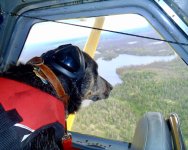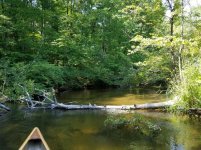Yes, travel is becoming more difficult and regimented with "wilderness travel" even more so. What else is to be expected when the population of the USA increases by 65.1 million people (nearly 19%) in the 25 years from 2000 to 2025? What percentage have our wilderness and backcountry areas in that time?
As media, including Canoetripping.net, increases the knowledge of specific areas, those areas will become more attractive to travelers. I had never heard of the Sylvania Wilderness until a few years ago, now it is on my go-to list. It was on this site that I first read about it. Like many others, I hope that I make it there before it becomes too crowded.
There was a T-shirt sold by Aerostich, a motorcycle touring and commuting garment company, that read: YOU ARE NOT STUCK IN TRAFFIC, YOU ARE TRAFFIC. We are all now traffic.
As media, including Canoetripping.net, increases the knowledge of specific areas, those areas will become more attractive to travelers. I had never heard of the Sylvania Wilderness until a few years ago, now it is on my go-to list. It was on this site that I first read about it. Like many others, I hope that I make it there before it becomes too crowded.
There was a T-shirt sold by Aerostich, a motorcycle touring and commuting garment company, that read: YOU ARE NOT STUCK IN TRAFFIC, YOU ARE TRAFFIC. We are all now traffic.
Last edited:


